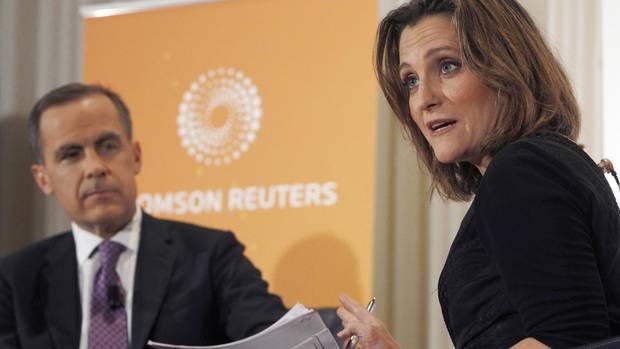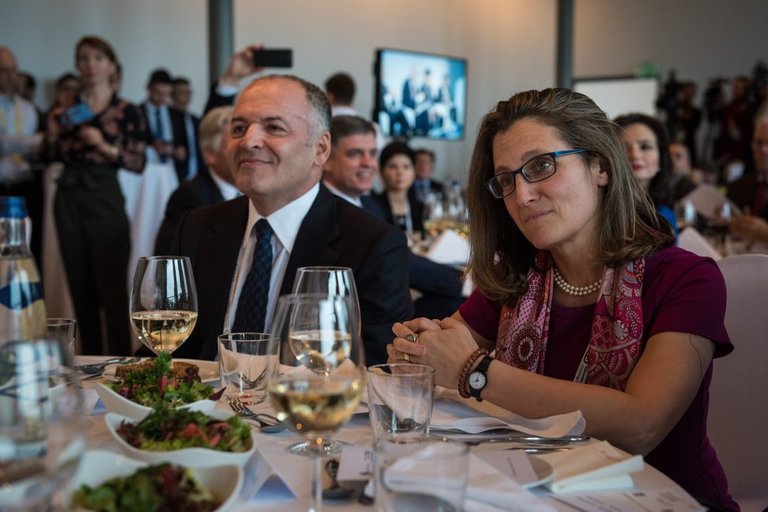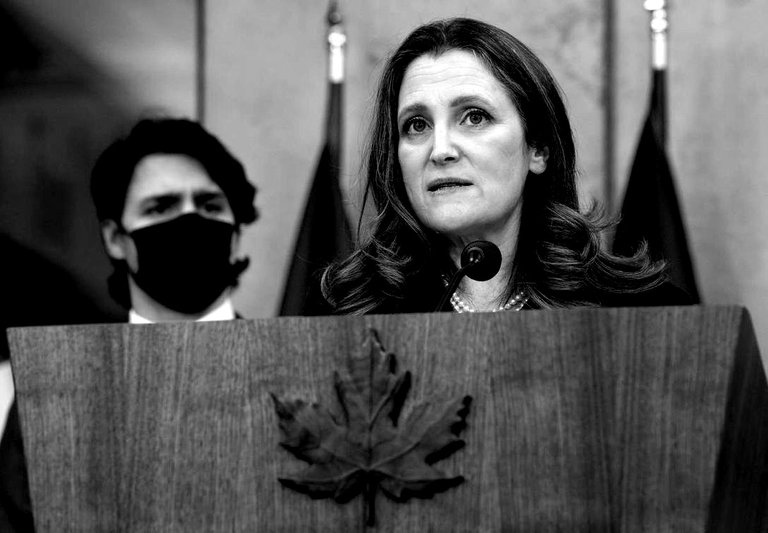
By now, you probably recognize Chrystia Freeland as the Canadian government official who froze the bank accounts of peaceful protesters in February 2022 and announced the enactment of the Emergency Act with Prime Minster Justin Trudeau.
Chrystia Freeland is a busy woman juggling multiple high-level positions in the Canadian government, acting in the dual role of deputy Prime Minister as well as the Minister of Finance. Freeland became Canada's first female to head the ministry in August 2020 when the acting minister William Morneau resigned in relation to conflict of interest allegations and the WE charity scandal that plagued the Trudeau government for years. The WE scandal centred around the awarding of multimillion dollar government contracts that implicated members of the Morneau and Trudeau families.
Prior to her current roles, Freeland has held several other high-profile positions within the Trudeau government since being first elected to Canada's parliament as a Liberal candidate in 2013.
- Minister of Finance (2021-present)
- Deputy Prime Minister (2021- present)
- Minister of Intergovernmental Affairs (2019-2021)
- Head of Canada's COVID-19 response
- Minister of Foreign Affairs (2015-2019)
- Member of Parliament in Canada's House of Commons (2013-present)
During the Pandemic of 2020-2021, it was Freeland who spearheaded Canada's COVID-19 response getting the nod from the Prime Minister. Acting as Minister of Intergovernmental Affairs and later as the new Finance Minister, she oversaw unprecedented spending to backstop Canadian businesses and workers in the form of the CEWS and CERB relief funds.
- CERB: Canada Emergency Response Benefit
- CEWS: Canada Emergency Wage Subsidy
Under Freeland's watch, the Canadian government spent an unprecedented $600 billion in Covid-19 relief ballooning Canada's federal deficit to $1.5 trillion. A CBC investigation of the Canadian government pandemic spending for 2020 found that, $106 billion went to assist individual Canadians, $118 went to businesses while an additional $17 billion went to government departments and agencies.
Canada has received both praise and criticism for the government's massive spending. Compared with their American neighbours to the South, Canadians generally faired much better receiving an average of $6,320 (CAD) in assistance over the course of several months in 2020.
To date, exact numbers of the relief packages and detailed accounting of billions in government relief spending remains elusive. As late December 2021, the Canadian government had yet to disclose how it spent $600 billion in Covid-19 relief while simultaneously asking parliament for billions more for the relief effort.
Commenting on the lack of transparency on spending, Kevin Page a former parliamentary budget officer, was mystified that by the end of 2021 the Finance Ministry had yet to present comprehensive reports. Specifically, Page points to the absence of public accounts and fiscal update documentation that seen as the 'hard numbers' to track government spending.
"We don't really have a good view — almost no view — of the government spending today. We have estimates of what the government thinks it will spend for 2020, 2021, but those are not the actual monies that are going out the door."
As pressure built on the Liberals to produce a full accounting of 2020-2021 spending, Freeland pivoted towards new crises of the Freedom Convoy in February and then again to the international stage with the invasion of Ukraine the following month.
Over the course of the pandemic, the Liberal government omitted a Federal Budget for the first time in Canadian history in 2020 and delayed the release of the 2021 Federal Budget for months. On April 7th 2022, Freeland released another delayed Federal Budget.
Overall, the budget was received with mixed reviews and widely seen as more fiscally conservative than the previous years of extraordinary spending. Of note, another $30 billion was pledged to the fight against COVID-19 along with a significant increase in defense spending, at least by Canadian standards. But what was most striking about the Budget was Freeland's hawkish speech. Federal Budget announcements are usually drab affairs but not this one. The Deputy PM took the opportunity to lash out at Vladimir Putin and Russia's invasion of Ukraine in what sounded more like a war-time jingoism than a budgetary plan.
And then, Vladimir Putin invaded Ukraine.The world we woke up to on February 24 was different from the one that had existed when we turned out the lights the night before.When Putin opened fire on the people of Ukraine, he also turned his guns on the unprecedented period of prosperity that the world’s democracies have worked so diligently to build over more than 76 years. Our rules-based international order—born from the ashes of the Second World War—today confronts the greatest threat since its inception. And so our response was swift and strong. Canada and our allies imposed the toughest sanctions ever indicted on a major economy. Russia has become an economic pariah. But Putin’s assault has been so vicious that we all now understand that the world’s democracies—including our own—can be safe only if the Russian tyrant and his criminal armies are entirely vanquished. And that is what we are counting on the brave people of Ukraine to do. Because they are fighting our fight—a fight for democracy—it is in our urgent national interest to ensure they have the missiles and the money they need to win. And that is what this Budget provides.
[emphasis added]
Canada.ca
The unusually speech underlined Canada's unwavering support for Ukraine with pledges of "missiles and money". It goes without saying that there was no additional information provided on Canada's pandemic spending as a new crisis comes to the fore.
Plutocrats and the Billionaire Whisperer
Born and raised on the Alberta prairies, Chrystia Freeland comes from a humble Canadian upbringing of Ukrainian heritage. By all accounts, Chrystia Freeland's rise has been nothing short of spectacular.
In stark contrast with the Prime Minister, Freeland's resume and qualifications are substantial. While having studied with some of the brightest minds at both Harvard and graduating from Oxford's Rhodes Scholar program, Freeland is also fluent in five languages, including Russian and Ukrainian.
She witnessed the fall of the Soviet Union first hand as a student and activist while studying in Kyiv in the early 1990s where she went on to become a corespondent for the Financial Times. For decades, Freeland has been an outspoken critic of Russia, and particularly president Vladimir Putin.
Over the years, Freeland has worked as a journalist for Reuters and Foreign Policy and has had her work published in the New York Times and the Atlantic.
In 2010, New York Magazine did a piece about Freeland and her fast-paced lifestyle working as the Digital Editor-in-Chief at Reuters stationed in New York.
83 Minutes with Chrystia Freeland, provided a snapshot of the "ball of energy" that is Mrs. Freeland. Freeland seems to be at ease with the globe-trotting lifestyle of an editor bouncing from New York, to Dubai, to Banff Canada, and back to New York and then off to the Russia to interview world leaders.
In addition to her work as a journalist, Freeland is also an accomplished author of three books. Her he most recent being her 2012 effort profiling the emergence of a new transnational elite in "Plutocrats: The Rise of the New Global Super-Rich and the Fall of Everyone Else" for which she was awarded the 2013 Lionel Gelber Prize.
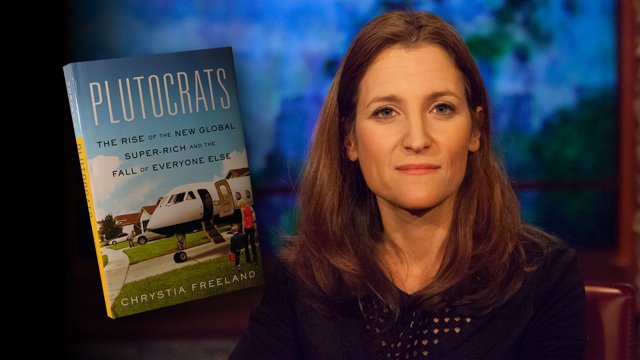
Her 2012 offering is an window into the world of the new "transnational elite" billionaire class and what separates them from the rest of humanity. The sometimes critical, often fawning, account draws heavily on her years covering the crème-de-la-crème of high finance as a journalist and rubbing shoulders with her subjects at international conferences and Manhattan social soirées.
The book examines the top of the pyramid, the 0.1% of top income earners across the globe, who are a world apart from even the 1%. Also known as, ultra-high-net-worth-individuals (individuals making upwards of $50 million - based on 2012 estimations), the 0.1% have more in common with each other than they do with the vast majority of their fellow nationals in the countries they reside. Their social network consists of other ultra-high-net-worth-individuals who frequent exclusive global events from the Aspen Ideas Festival, to Wimbledon, to to the World Economic Forum in Davos Switzerland.
Some of Freeland's former co-workers described her unusual talent of befriending the elite by dubbing her the "billionaire whisperer". They describe her tendency to refer to members of the global elite as her friends casually peppering the names of industry leaders into her conversation. Indeed, much of Plutocrats owes its success to Freeland's access to some of the world's most famous titans of industry.
The names of some individuals Freeland considers as "friends" might be surprising: Google's former head Eric Schmidt, investment banker Roger Altman, Dave Rubenstein of the Carlyle Group, former Treasury Secretary Larry Summers, WEF staple and Ukrainian billionaire Victor Pinchuk, billionaire investor George Soros, former US Treasury Secretary Robert Rubin, a slew of Russian and Ukrainian plutocrats and founder and head of the World Economic Forum Klaus Schwab.
Prominent Canadians include former PM Paul Martin, former governor of the Bank of Canada and the Bank of England Mark Carney, former BlackRock executive Mark Wiseman, CEO of Rio Tinto Dominic Barton, and Royal Bank of Canada executive John Stackhouse.
In the Acknowledgements of Plutocrats, Freeland gives thanks and praise to her fellow Canadian WEF members and new friends she's made in the global super rich while frequenting Davos.
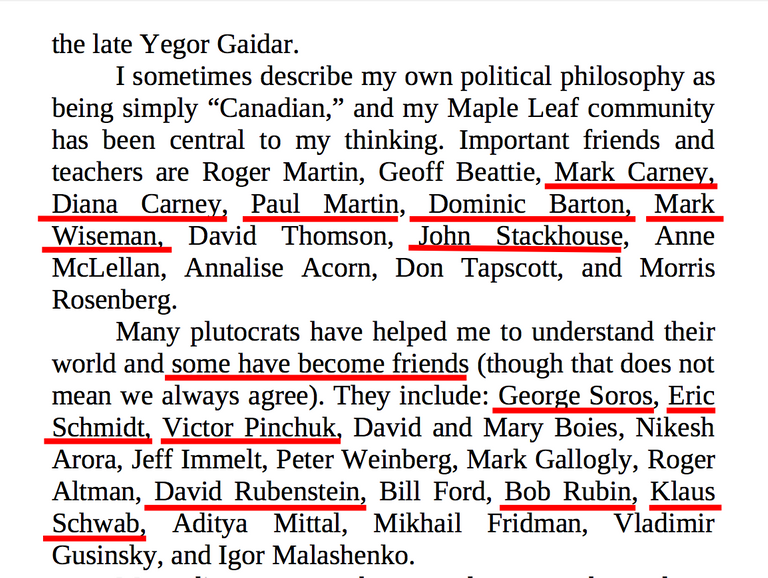
Darling of Davos
Of all the Canadian members of the WEF, Mrs. Freeland is without a doubt one of the most active while also being one of the organizations proudest members.
Somehow, despite working dual roles in the Canadian government, Freeland is also able to find time to dedicate to helping set the agenda for the World Economic Forum.
Today, Freeland is a on the Board of Trustees of the WEF and who outline the program for each Davos conference. She's an alumni of the Young Global Leaders program, a distinction she shares with her boss at her day job, Canada's PM Justin Trudeau.
In 2016, Freeland was among several Canadian diplomats to grace the stage at Davos in her capacity as Canada's Minister of Foreign Affairs.
Other prominent Canadians attending along with Freeland included:
- William Morneau - Minister of Finance
- Navdeep Bain - Minister of Innovation and Technology
- Cathrine McKenna - Minister of Environment and Climate Change
- Philipp Couillard - former Premier of Québec
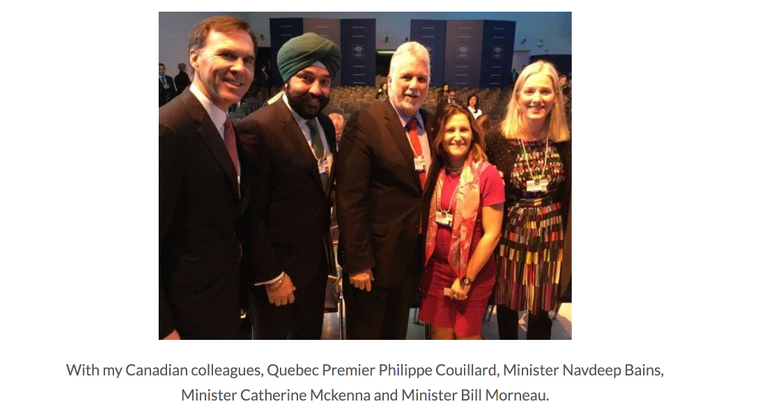
Freeland seemed to revel in her new found status. She uploaded numerous photographs from the Davos retreat posing for pictures with political leaders and world thought leaders.
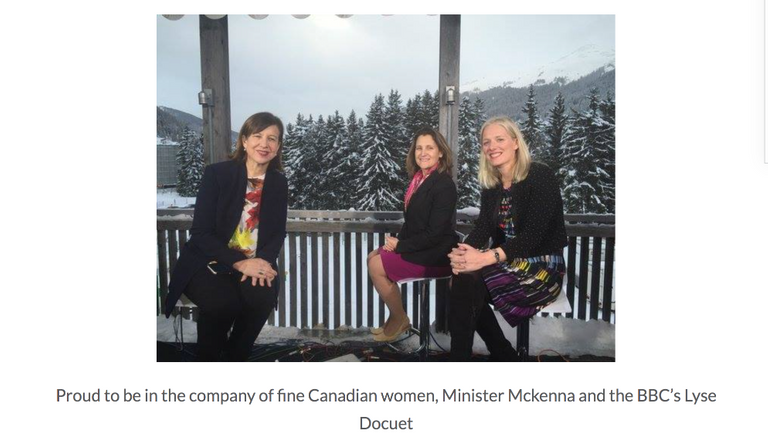
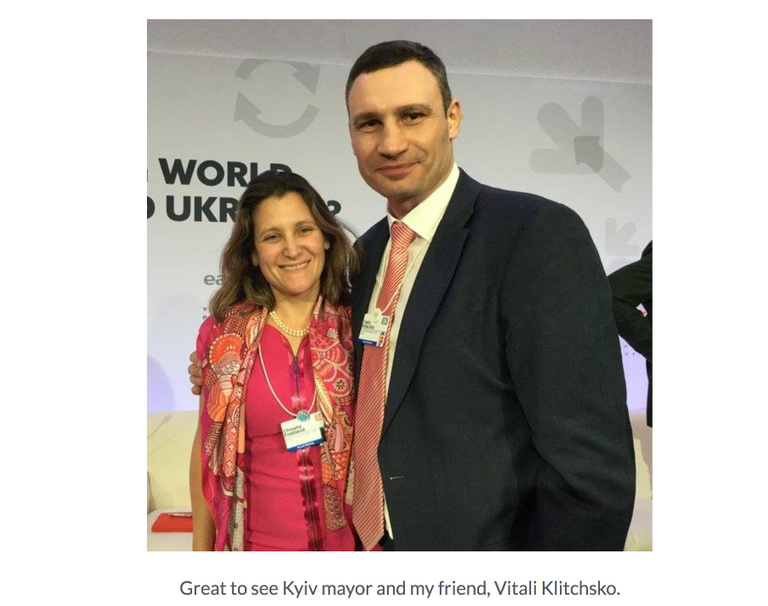
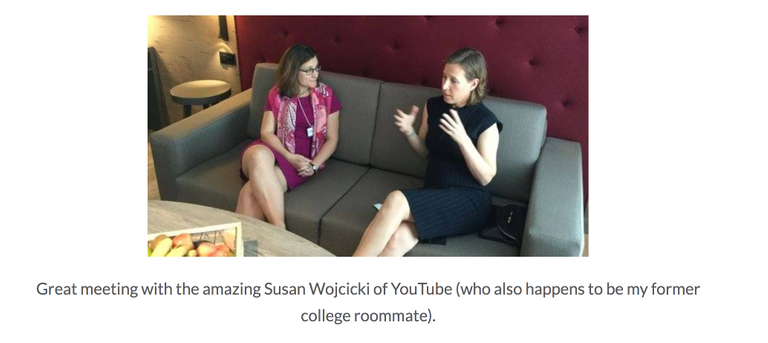
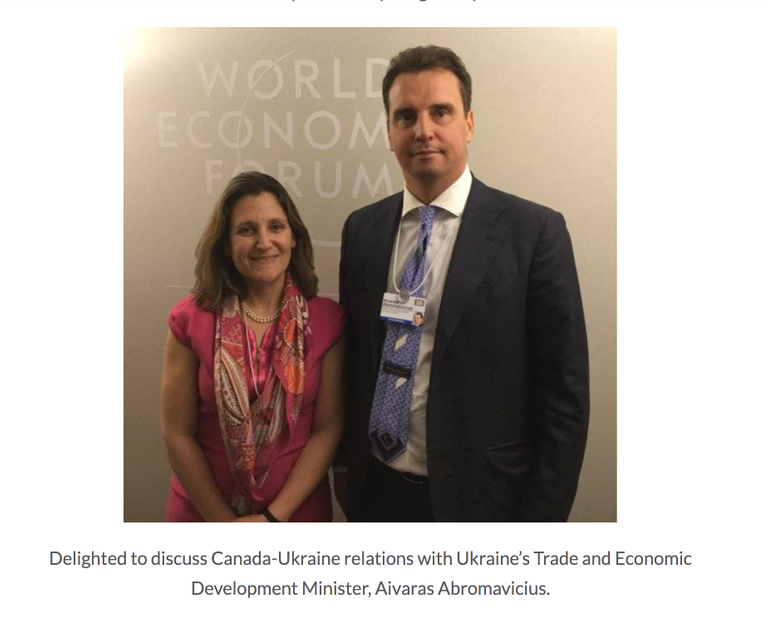
Subsequently, all of Chrystia's memories from Davos have been removed and deleted from her page on the Liberal party website.
https://liberal.ca/?new=cfreeland.liberal.ca
All of these photos were retrieved using the Wayback Machine at archive.org.
Of course, these were happier times: before the Pandemic and before the Freedom Convoy. But why take them down? And why now?
One can only speculate about the reasoning behind the decision, likely a public relations or branding decision as more people start to scrutinize the World Economic Forum and their policies.
It certainly raises some eyebrows.
Freeland appears to be beaming in all of her photographs.
What could cause her, and likely her PR team, to remove these photos from the record?
Surely it wasn't the photograph with her former roommate and now tech giant operator, Susan Wojcicki? Or fan favorite former heavyweight boxing champion Vitali Klitchsko?
No, that's certainly not it.
There's one other photo with a famous man... what's the guy's name?
George Soros.
My Dear Friend George Soros
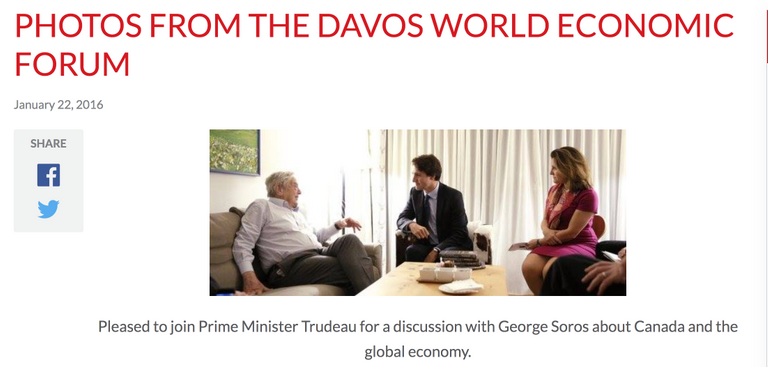
[George Soros, Justin Trudeau, Chrystia Freeland at Davos 2016]
The photo of Soros, Trudeau and Freeland is definitely an unofficial meeting, one of a plethora of behind the scenes meetings between political figures and industry leaders that occur behind closed doors.
As Peter Goodman writes in his book Davos Man (2022) of the mythical 0.1%, the real Davos elite.
[Davos Man] rarely appeared in the main areas of the Congress Centre, where the panel discussions were held, generally confining themselves to exclusive lounges for corporate members or private suites at hotels scattered around town.
Additionally, this photograph of George Soros in the company of Freeland, cannot be simply waived away as a "one-off" chance encounter. In fact, Freeland's relationship with George Soros goes back many years.
After publishing her book Plutocrats in (2012), Freeland was busy working on a new project. She began work on a biography of the Hungarian-born hedge fund tycoon George Soros, illustrated here by her Foreign Policy profile.
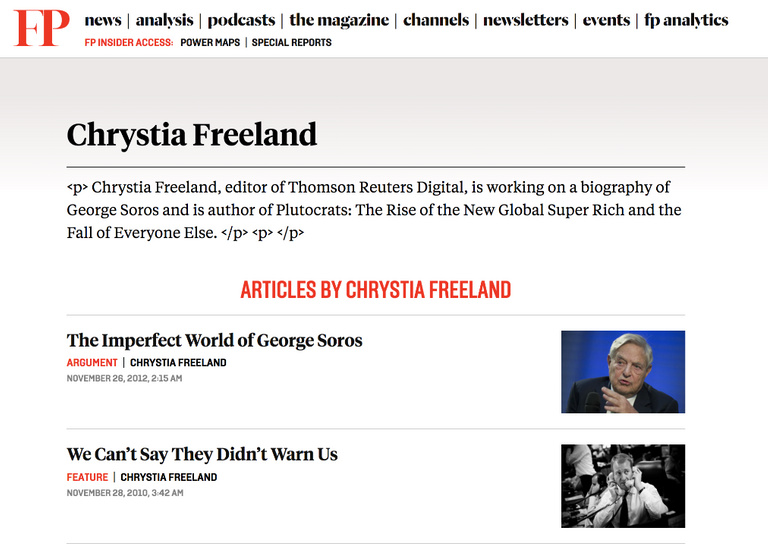
While working as a journalist for FT in 2008, Freeland sought to interview a close associate of Soros, non-other than Hillary Clinton's campaign manager and Washington insider, John Podesta. Podesta's aid encourages the meeting believing the resulting coverage would be "very positive".
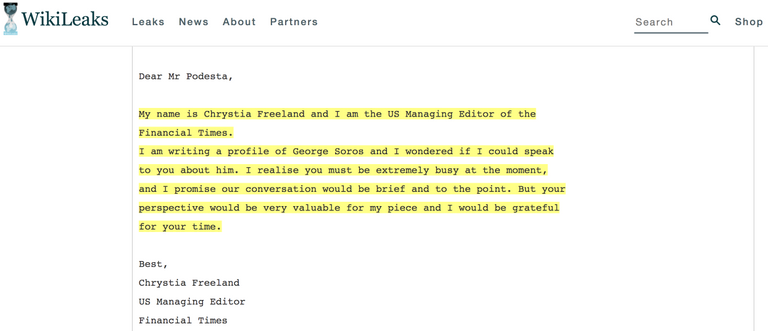
But there's another connection to Soros that dates back to the early 1990s with ties to the WEF and another eastern European billionaire, Victor Pinchuk.
Plutocrat Victor Pinchuk
Victor Pinchuk is generally described as a Ukrainian oligarch with assets in a variety of industries throughout the country. Mr. Pinchuk is very involved in Ukraine's politics and was previously a member of parliament in the Ukrainian government.
Victor Pinchuk controls assets in steel-pipe production, railway wheels, media and banking. A former parliamentarian, he avoids the daily politics in Ukraine but has devoted enough cash and resources to the cause to reap benefits in the future.
Outside of Ukraine Pinchuk is not a household name but he's connected to some of the world's most powerful people. He's involved with various international organizations and is well known for his generous political donations and his philanthropic endeavors.
The Ukrainian billionaire is a regular staple of the Davos scene and is known widely for his support of the fine arts funding numerous museums, theatres and dance companies.
The Pinchuk Foundation sponsors several Davos initiatives including:
- Ukrainian House Davos
- The Davos Ukrainian Breakfast
- The Davos Philanthropic Roundtable
Partners of the Pinchuk foundation include Soros' Open Society, the Clinton Foundation, the Atlantic Council and US think tank the Brookings Institute. Both George Soros and Chrystia Freeland are former speakers at the Ukrainian Breakfast.
Over the years, Pinchuk has donated an estimated $10-$25 million to the Clinton Foundation. Pinchuk's 'generosity' places him at the centre of the Clinton Foundation pay-to-play scheme during Hillary's tenure as Secretary of State.
Though Pinchuk's US political donations are heavily skewed towards the left, Pinchuk paid 150k to Donald Trump for a 20 minute with Y.E.S. (Yalta Europe Strategy) in 2015 and another 115k to neocon and war-monger extraordinaire John Bolton for a couple of speeches in 2017.
Other events sponsored by the Pinchuk Foundation are the Munich Ukrainian Lunch which aims to discuss Ukraine in the context of global security and the Y.E.S (Yalta European Strategy). Both Freeland and Soros have participated in these events over the years. Freeland has not disclosed if she was paid for her participation in these panels. Other notable speakers include Bill Clinton, Tony Blair and Volodymyr Zelensky.
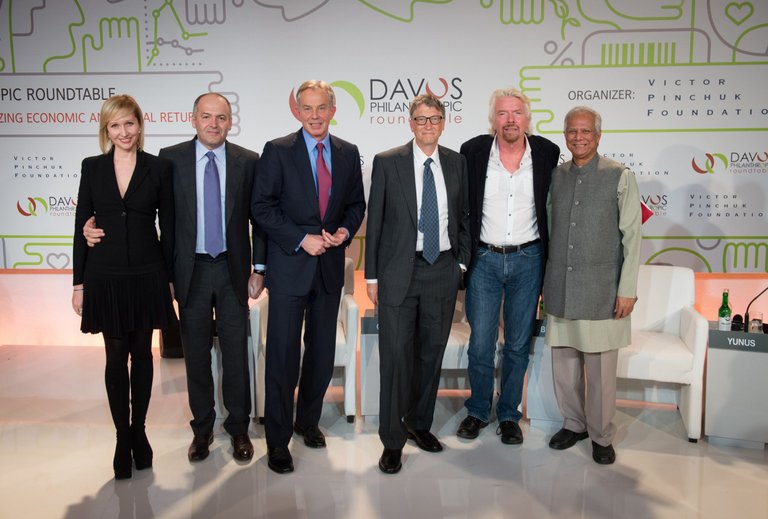
Philantro-Capitalists
In a chapter of her 2012 book titled "Philanthro-Capitalism", Freeland describes how increasingly the ultra-rich engage in crafting, in some cases restoring, public perception of and their legacy through philanthropic enterprises. Highlighting the achievements of Bill Gates and his foundation's work in the fields of health and education as notable examples. Noting that:
[Philanthro-Capitalists] do not want to fund the social sector, they want to transform it.
In one passage, Freeland describes how George Soros is the OG of philanthro-capitalism describing the investment magnate as "a pioneer and role model for the socially engaged billionaire". Later, she describes Pinchuk's love for the fine arts and the millions he's poured into museums, art gallery's, theatres, and schools.
Like many of his peers Pinchuk's philanthropy does not come from pure benevolence and love of his fellow man. Much of Pinchuk's efforts are directed at the West, to curry political favour, because western audiences are enamoured by billionaire philanthropy.
Critics of billionaire philanthropy have another name for this type of activity: Reputation Laundering.
Ironically, when Freeland still worked for the Financial Times she interviewed Pinchuk over an expensive dinner in 2009 in Crimea. Over burgundy and borscht, they discussed the possibility of Ukraine joining the European Union and how Victor met his second wife Elena. When asked whether joining the EU would provide 'political protection', Pinchuk's response demonstrated a keen understanding of western liberal politics.
“Frankly speaking, this topic – European Union membership – is not very strong protection,” he says. “If you speak about freedom of speech, for example, that is much stronger protection for you. If you speak about the European Union, what kind of protection is that?”
Why does freedom of speech offer better political protection?
“Because the rest of the world really likes to speak about it,” Pinchuk says, with the slightly weary air of an eastern European explaining the obvious to a western naïf. “If somebody attacks you, then you can say, ‘It’s because I am a supporter of freedom of speech.’ It is much easier to play the game.”
Here, Mr. Pinchuk reveals "the game", the game is one of access not philanthropy for its own sake. It is also a game of perception over substance. Pinchuk has successfully deciphered how to play the game of philanthro-capitalism by purchasing access to elite circles. Having powerful friends on the international stage has helped Pinchuk survive the many political upheavals of Ukrainian politics.
In another section of the interview, Pinchuk freely admits that luck played a central role becoming a billionaire. At one point Freeland slyly observes that Pinchuk's success stems in part from another factor.
Metallurgy may be Pinchuk’s vocation and entrepreneurship his avocation, but his true genius is befriending influential people.
Victor Pinchuk's second marriage in 2002 was to the daughter of the former Ukrainian president Leonid Kuchma which 'catapulted Pinchuk to the apex of Ukrainian politics'. It is widely speculated that his marriage allowed Pinchuk's companies to prosper.
The art of befriending influential people rings true as much for Freeland the "billionaire whisperer", as it does for Mr. Pinchuk. Both have shrewdly hitched their wagons to the elites at Davos and have reaped the benefits of such associations.
As a major political donor, Pinchuk has been welcomed into the upper echelons of the global elite providing millions in funding for the Atlantic Council, the Clinton Foundation and the international conference circuit. While Mrs. Freeland has gone from a financial reporter at Davos events to being herself a speaker, a Davos agenda setter and a member of the WEF board of trustees.
Indeed, in her book Freeland observes that an invitation to Davos:
“marks an aspiring plutocrat’s arrival on the international scene.”
-Plutocrats (2012)
A decade ago, in her examination of the über-rich, Freeland noted that for those of the intellectual class with expertise or the right set of skills could become, what she describes as, a "superstar" in their field.
Whether a top chef, an architect, lawyer or even a dentist, capable entreprenuers could be among those selected to enter the 'plutonomy', more specifically, the exclusive economic sphere of the global elite. Standout "superstars" in their fields had the opportunity to service an ultra-wealthy clientele that would in turn elevate these individuals to celebrity and wealth.
While Freeland focuses her study on the financial gain of those brought into the inner circle of the 'plutonomy', for example high powered lawyers on retainer for elite clients, there seems to equally be a place for political courtiers to cater to the über-rich and their political aspirations. One might even suggest that Freeland, who spent more than a decade idolizing the captains of high-finance, would make an ideal candidate for such a position.
As Freeland declared to New York Magazine,
“Journalists are the geishas of our age".
Considering the definition of a Geisha: is a member of a professional class of women whose occupation is to entertain men, evidently this offhand comment illustrates how cozying up to the power often accelerates career advancement.
Influences on Chrystia Freeland
When we look at the arch of Chrystia Freeland's career there's certainly some irony as she's gone from a so-called 'critic' of the global power elite as a journalist to a member of the political class that frequents the World Economic Forum events.
Counting some of the world's most powerful billionaire's as close friends, having behind the scenes private meetings with individuals such as George Soros, spending multiple years attending elite gatherings such as Davos, it does make one wonder where Mrs. Freeland's loyalties lie.
Some of Mrs. Freeland's associates told the Globe and Mail that while she worked as a media manager:
She was criticized by some of her colleagues and charges for building her own brand at the expense of running the shop and getting the best out of others. A common suggestion, also made by some people who have worked under her in politics, is that she struggles to relate to those who don't move in her rarefied circles.
Many of those associated with the WEF and with Mrs. Freeland are highly connected to what might be described as a neo-liberal/neo-conservative nexus of international organizations such as the Atlantic Council, the Brookings Institute, the Clinton Foundation, the Council on Foreign Relations, the Trilateral Commission, the Intelligence community, and Wall Street fortune 500 companies, all of which have enormous geo-political power and influence.
The connections to the WEF are, for the moment, at the forefront of public attention but the network is much larger in scope and runs much deeper than simply the participants at Davos.
It is this spiderweb of entities whose collective agenda contributes to the WEF aims which threaten to supersede the interests of sovereign democratic nations. As Freeland herself writes, the global transnational elite have more in common with one another than with their countrymen back home.
After all, the über-rich are transnational and are not confined by national borders, they therefore have little loyalty to any nation and thus no allegiance to the interests of the people in the countries of their birth.
In the end, it would appear that Mrs. Freeland has no shortage of billionaires whispering in her ears.
*Edit - spelling and grammar
More Canada and the WEF
Upcoming posts in this series will dive deeper into conflicts of interest in Canada's Liberal government, more on Liberal Cabinet Ministers and WEF partnerships, WEF agendas that are being adopted by the government of Canada, and the role of major global think tanks in shaping global policy.
Related Articles
- Canada and the WEF - A Deep Dive Intro
- Canada and the WEF (Part I) - Captured Government Controlled Opposition?

